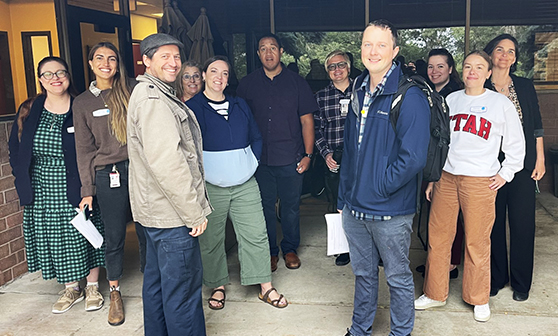Feeling disconnected at work is an experience many people can relate to. It’s also the motive behind the Department of Family and Preventive Medicine’s newest community: Research Connect.
Research Connect was created to gather research staff across DFPM to connect and collaborate. The idea materialized in response to conversations among research staff who expressed their sense of isolation within their respective projects.
The catalysts of the new community include Eliza Taylor, Danielle Plank, Tanis Garcia, and Andrew Langi.
Research Manager Eliza Taylor has experienced feeling disconnected. “During the pandemic, I basically did my whole Master of Public Health (MPH) program online. When I came into the department research support area, I was isolated maybe more than normal,” says Taylor.
The new initiative is a project of the Research and Scholarship team at DFPM. The mission of the research team is to expand the possibilities of health through discovering the determinants of health and developing evidence to improve health. Research Connect aligns well with this mission.
The community is designed to help provide research staff working on a wide variety of projects with the tools they need to succeed. Those who join the group learn about research resources, an essential part of contributing to DFPM’s mission.
“With Research Connect you’ll learn your resources and who the experts are,” says senior research manager Tanis Garcia. “You’ll hear about others’ research and skill sets and maybe you can incorporate what you’ve learned into your own research which inherently expands the possibilities of health.”
Research Connect not only aligns with the department’s mission but also resonates with many of the recently introduced core values of DFPM staff: embracing a growth mindset, providing mutual support, and fostering a sense of belonging by encouraging research staff to share frustrations, breakthroughs, and solutions to common problems.
"DFPM is a team, and we want to collaborate. More collaboration will lead to stronger connections, and longevity within the department,” says Garcia.
Research Connect kicked off with a lunch meeting in mid-September. Attendees introduced themselves, the type of research they do, and who they work with.
Evaluation Specialist Elena Gardner, MPH attended the first gathering. “I have been in my role a few months so getting to know other people and projects is important to me. I met a few folks when I worked as a graduate research assistant, but it was nice to have some food together instead of just saying hi in the hallway. I also met people from the admin side of research work in real life when we had only emailed previously,” says Gardner.
Taylor envisions Research Connect as a space where peers can come together to find community, emphasizing the importance of increased support and the formation of workplace friendships.
“I want people to feel like this is a casual environment for people to build connections and friendships instead of just another meeting,” says Taylor.
DFPM staff members who support research in any capacity are encouraged to join the group. "It can be someone who makes purchases for research because that is supporting research. I am not a researcher myself. I handle the accounts and books for projects,” says Garcia.
Those who join the Research Connect community can expect to participate in social gatherings, informal research presentations, and a variety of training sessions. The organizers hope individuals will be stronger in their own research studies because of the connections they’ve made and the tools they’ve received through Research Connect.
Those interested in Research Connect can join them for their next gathering on Thursday, October 26 from noon to 1 p.m. at Red Butte Garden for a causal walk. For questions or information about Research Connect or the upcoming event, please contact Eliza Taylor.
